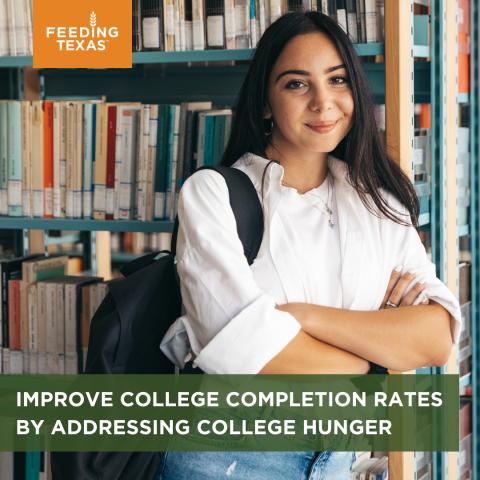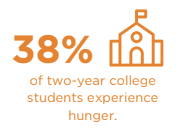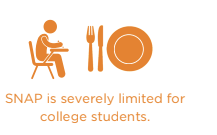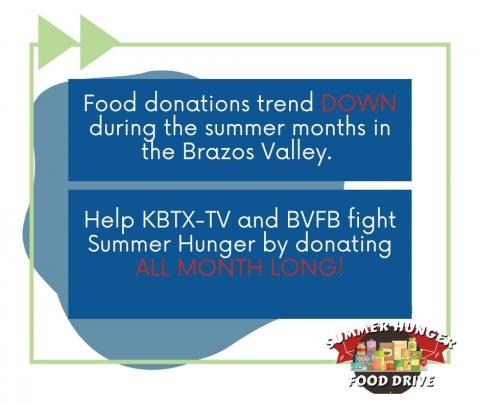
The Feeding Texas network is calling on state lawmakers to maintain access to SNAP for low-income students enrolled in vocational and technical degree programs. Access to SNAP for college students was guaranteed during the pandemic, but the Texas legislature needs to act to ensure students can continue to access the food assistance they need to finish their degrees and go on to gainful employment.

Texas Students shouldn't have to choose between food and education.
College students in Texas shouldn’t have to choose between food and education. Texas lawmakers can help improve college completion rates by maintaining access to SNAP for low-income students enrolled in vocational and technical degree programs.
Though federal policy severely restricts access to SNAP for college students, Congress made changes to guarantee food assistance for more students during the pandemic. However, this policy will expire when the Public Health Emergency ends, and thousands of students could lose their SNAP benefits at recertification.
BACKGROUND
Even with tuition aid, 38% of students at two-year colleges and 29% of students at four-year universities experience hunger, according to a recent #RealCollege survey. Access to SNAP is severely limited for college students, especially those attending school more than half-time. Eliminating hunger on Texas college campuses is critical to ensure our workforce remains strong, and our future leaders thrive.
A simple change in policy will allow low-income students in vocational and technical degree programs to access SNAP while they pursue their educational goals. The network is calling on the Texas Legislature to instruct the Texas Health and Human Services Commission (HHSC) to identify college degree programs that are vocational or technical in nature, so that students enrolled in these programs can receive SNAP.
PROBLEM
 College tuition costs are rising, and with current inflation, so are the costs of housing, food, and other necessities. The inability to afford these basic needs is the number one reason cited by community college students for not completing their education. Even with tuition aid, 38% of students at two-year colleges and 29% of students at four-year universities experience hunger, according to a recent #RealCollege survey.
College tuition costs are rising, and with current inflation, so are the costs of housing, food, and other necessities. The inability to afford these basic needs is the number one reason cited by community college students for not completing their education. Even with tuition aid, 38% of students at two-year colleges and 29% of students at four-year universities experience hunger, according to a recent #RealCollege survey.
 College students in Texas shouldn’t have to choose between food and education. Unfortunately, access to our nation’s largest anti-hunger program, the Supplemental
College students in Texas shouldn’t have to choose between food and education. Unfortunately, access to our nation’s largest anti-hunger program, the Supplemental
Nutrition Assistance Program (SNAP), is severely limited for college students, especially those attending school more than half-time. Eliminating hunger on Texas college campuses is critical to ensure our workforce remains strong, and our future leaders thrive.
SOLUTION
A simple change in policy will allow low-income students in vocational and technical degree programs to access SNAP while they pursue their educational goals.
The Texas Legislature should instruct the Texas Health and Human Services Commission (HHSC) to identify college degree programs that are vocational or technical in nature, so that students enrolled in these programs can receive SNAP.
Our workforce depends on students graduating with the skills and training that they need to succeed. Improving short-term food assistance will help these students along their path to economic self-sufficiency.
The inability to afford basic needs like food & other necessities is the #1 reason cited by community college students for not completing their education.
Our workforce depends on students graduating with the skills they need to succeed. The Texas Legislature must address college hunger!

